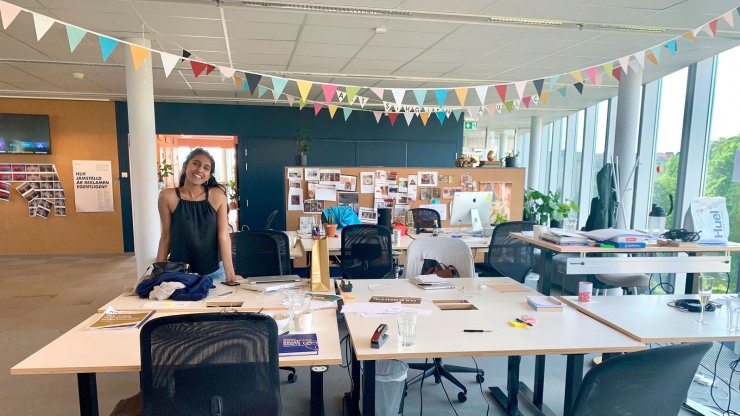In a summer internship at the Swedish advertising firm NORD DDB, rising junior Harshita Agarwal unearthed surprising insights that revealed decision-making patterns and biases among Swedes.

PROVIDENCE, R.I. [Brown University] - Harshita Agarwal loved chemistry in high school - so much so that when she came to Brown University, she intended to concentrate in the subject.
"I loved the idea of being able to solve all these abstract problems and visualize these things you can't see with the naked eye," Agarwal said. "In chemistry, there's a mix of cold, hard facts and room for creativity."
But the native of Kathmandu, Nepal, quickly realized that as much as she loved chemistry, she craved also the intense human interaction perhaps more common in other professions. A transition to behavioral decision sciences followed soon for Agarwal - the relatively new concentration at Brown encourages students to take courses in such disparate subjects as psychology, economics, applied math and neuroscience, equipping graduates with the skills to understand how people, institutions and even nations make decisions.
"I know I want to work with people who are interested in how people think and what makes them tick," Agarwal said.
This summer, the rising junior traveled to Sweden to do just that. She and another Brown student, international relations concentrator Maya Gros, worked as interns at NORD DDB, the Swedish branch of advertising agency DDB Worldwide. They spent much of the summer helping the firm create advertising campaigns that tapped into the fascinating, often self-contradicting human psyche.
"In the courses I take for behavioral decision sciences, I learn about how people make decisions and what biases they have," Agarwal said. "Being able to apply that knowledge in a creative way was so rewarding."
While working on the research phase of a campaign for McDonald's, Agarwal turned up some surprising facts. She learned that the McDonald's logo is green and yellow, rather than red and yellow, in Sweden - a result of previous research that found Swedes greatly value sustainability and nature, words often associated with the color green. She also learned that the fast-food company has become the biggest book distributor in Sweden since working with NORD DDB on a previous campaign that swapped out toys for books in Happy Meals. (The campaign's slogan: "Big enough to make a difference.")
Some of the insights unearthed in the research phase were as funny as they were interesting. While working on a campaign for a Swedish food distribution company, Agarwal came across a statistic that made her chuckle: "Apparently, 46 percent of women find pictures of men who are holding fish more attractive than pictures of those same men when they aren't holding fish."
Most rewarding about Agarwal's experience, she said, was exposure to colleagues who came from a wide variety of backgrounds, both academic and cultural. As she moved between departments, she interacted with staff members who had studied everything from psychology to linguistics to fine arts.
"All of the staff there emphasized that you don't need a specific type of academic knowledge to work in a creative field - you just need to know how to bring your knowledge to the discussion table," Agarwal said. "We all worked so well together - not despite our different perspectives, but because of them."
In addition to assisting with background research, Agarwal and Gros worked with teams of communications, design and studio production staff to produce online advertisements, even co-starring in a short and humorous video posted on the McDonald's Sweden Instagram feed.
In the end, Agarwal realized the process of creating ads wasn't so different from her first love of chemistry: it combines cold, hard facts - statistics and consumer insights - with creativity and experimentation in the form of designs, colors and messages.
"What NORD DDB does is find out what people care about today and what they might care about in the future," Agarwal said. "I'm very interested in finding out how to use that data to spark creativity and make a difference in the world."






